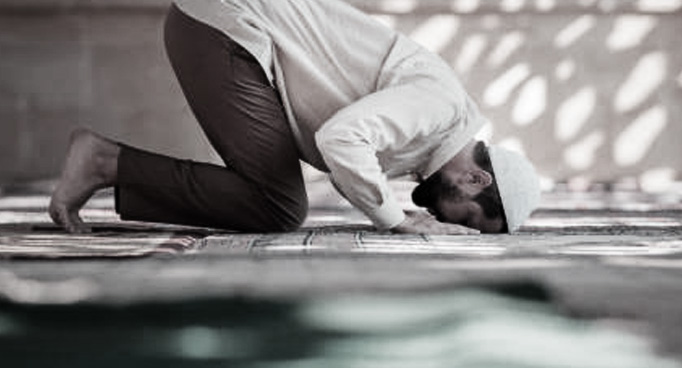Islamic prayer (salat) is reinforced five times a day and designed to be extremely psychologically effective in imprinting routine upon the believer. Christians rarely, if ever, pray this much. These times of the day are more or less correspondent to the Sun’s movement in the sky. We know these are all reinforced at powerful times of occult activity.
Islam is bound together by this type of prayer and energetic intention more than anything else. While Christians do put emphasis on praying, reading the Bible and rituals like mass can take precedence.
الْعَهْدُ الَّذِي بَيْنَنَا وَبَيْنَهُمُ الصَّلاَةُ فَمَنْ تَرَكَهَا فَقَدْ كَفَرَ
The covenant between us and them is the Salat, so whoever abandons it he has committed disbelief.
Hadith 2621, Jami’ at-Tirmidhi
THE NIGHT JOURNEY
Muhammad was instructed on how to pray during the so-called ‘night journey’ or ‘miraj’. Muhammad uses a flying horse to traverse the seven circles of heaven using a ladder, stolen from the alchemical concepts of the seven Chakras and the Kundalini channel of the spine. Upon ascending to heaven, in the original version of this story by Ibn Abbas, this ape supposedly meets a ‘rooster headed angel’ and three others, who are falsely claimed to be under the dominion of Allah. This earlier version of the story is a major testament to the hoax of Islam.
The God instructs him to tell Muslims to do fifty prayers per day, which frankly is near impossible, so Muhammad ‘intercedes’ and gets it cut down to five.
In the more ‘orthodox’ and following versions of the story, Muhammad simply leads all of the prophets including Abraham, Isaac, John the Baptist, Jesus and so on in prayer after meeting them on each seventh layer, and then ascends to the highest heaven, bartering directly with Allah.
FAJR
The first prayer is called Fajr, which is done at the beginning of dawn to sunrise. Muslims claim Fajr ‘energizes them’ and lends them ‘protection’ throughout the day. Upon waking up, the Muslim mind is conditioned to immediately pray. From a young age, Muslims are indoctrinated that Fajr saves them from hellfire.
ٱلۡفَجۡرِ كَانَ مَشۡهُودٗا
Indeed, the dawn prayer is witnessed [by the angels].
Quran 17:78
Muslims are required to wash and perform wudu before doing this. Two rakaat movements , a set of prescribed movements and supplications vaguely analogous to yoga in the direction of Mecca, are performed by the Muslim practitioner.

Why are the vajrasana and balasana poses used? Firstly, both are easy and anyone not severely disabled can do this. Secondly, vajrasana keeps one in a meditative (i.e. receptive) state and balasana channels energy from the Base to the Crown Chakra in the direction of Mecca and Medina, empowering aspects of this putrid program. When used in the context of Islam, it is an obvious visual symbol of submission. Total slavish worship. Balasana also fights fatigue and does energize for this reason, leaving Muslims to put the cart before the horse. In addition, these kinds of movements set a deep impression on the believer of Islam upon waking (in varying degrees of residual trance) and condition the mind towards serving the thoughtform of Allah.
The subliminal message of Fajr is that one’s entire beginning and protracted existence as a being is dependent on servitude to this thing. Daily investments in a program like this can pull someone deeply in.
ZUHR
As the Sun declines towards the west from the middle of the sky, Zuhr is performed at noon. Zuhr is essentially performed at the apex of the Sun’s power during the day and phrased in Islamic literature as the ‘gates of heaven opening’. At this time, Astrologically, the Sun approaches the 10th House. For Muslims, they credit Zuhr with the ability to pass by judgement undetected, either in the day-to-day or on the Final Day of Judgement.
Since this period of the day at noon is the most active and busiest time of day, Zuhr brings the Muslim recipient’s mind back to ‘Allah’ and their religiosity, tearing the individual away from others and taking things away from worldly pursuits. It serves to impress Islam upon the rational, active side of the mind that is stronger during the daytime. For emphasis of this, four rakaat movements are prescribed. This often takes from five to ten minutes.
Beyond the obvious siphoning of energy in our estimation, all this is a corruption of solar energy’s ability to protect.
ASR
Asr is practiced during the late afternoon as the Sun’s power begins to decline. For Islamic mystics, Asr relates to an allegory of the Muslim ‘slave’ going back to their creator upon death. Once again, four rakaat movements are mandatory.
Conventionally, obedience to Asr is considered tantamount to worldly success and success with others. The Sun passes through the 9th, 8th and 7th Houses at this point.
MAGHRIB
Maghrib is practiced anytime from dusk to the near-midnight hours. Maghrib has three rakaat movements, which can go up to five as sunnah (recommended).
مَنْ ثَابَرَ عَلَى اثْنَتَىْ عَشْرَةَ رَكْعَةً بَنَى اللَّهُ عَزَّ وَجَلَّ لَهُ بَيْتًا فِي الْجَنَّةِ أَرْبَعًا قَبْلَ الظُّهْرِ وَرَكْعَتَيْنِ بَعْدَ الظُّهْرِ وَرَكْعَتَيْنِ بَعْدَ الْمَغْرِبِ وَرَكْعَتَيْنِ بَعْدَ الْعِشَاءِ وَرَكْعَتَيْنِ قَبْلَ الْفَجْرِ
Whoever persists in praying twelve rak’ahs each day and night, Allah, the mighty and sublime, will build for him a house in paradise: four before Zuhr and two after Zuhr, two rak’ahs after Maghrib, two rak’ahs after Isha’ and two rak’ahs of Fajr.
Hadith 1795, Sunan an-Nasa’i
As we can see, Islam encourages adding extra rakaat movements. Like many things in Islam, to say this is a ripoff of Satanism is an understatement.
Maghrib is associated with cleansing of sins. The Sun moves directly into the 7th House at dusk frequently. This was also considered the ‘setting place’ in Ancient Astrology and deals with others: maghrib prayer is known as the most social of the prayers. The social nature of Maghrib is reflected in the hadith:
لاَ تَزَالُ أُمَّتِي عَلَى الْفِطْرَةِ مَا لَمْ يُؤَخِّرُوا الْمَغْرِبَ حَتَّى تَشْتَبِكَ النُّجُومُ
My community will remain on the natural disposition of goodness as long as they do not delay the Maghrib prayer until the stars become intertwined.
Hadith 418, Sunan an-Nasa’i
ISHA
Isha is practiced any time around midnight but typically as close to it as possible. Muslims have many beliefs about avoiding the so-called ‘night horns of the devil’ where they may fall into disbelief or be seduced by otherworldly powers. Concluding the pattern of each day with this prayer is as important as Fajr is in starting the cycle. Muslims are supposed to shed guilt, stress and all fears at this point. It is a reset, a sort of daily confessional.
Night is when the feminine and intuitive side of the soul is most powerful: Islam as a program seeks to keep this suppressed at the soul level at any cost. The Sun comes to transit near the 4th House or Imum Coeli at this point, likewise associated with darkness, hidden things and the Moon. As most humans are tired at midnight, this also serves to create impressions on the unconscious mind.
OTHER PRAYERS
JUMAA
Muslims often go to group prayer at the mosque on Friday, which we know to be the day of Venus.
For Muslims, this day is a day where their prayers are more ‘likely’ to be accepted by Allah.
Zuhr is replaced during this day by a different prayer called Jumma which is congregational and oriented around practicing with others at mosque. Again, the reasons for this to any occult novice knowing the planetary meanings should be pretty obvious. Interestingly, the Quran indicates one of the points of this is to divert attention away from trading on a Friday:
يَـٰٓأَيُّهَا ٱلَّذِينَ ءَامَنُوٓاْ إِذَا نُودِيَ لِلصَّلَوٰةِ مِن يَوۡمِ ٱلۡجُمُعَةِ فَٱسۡعَوۡاْ إِلَىٰ ذِكۡرِ ٱللَّهِ وَذَرُواْ ٱلۡبَيۡعَۚ ذَٰلِكُمۡ خَيۡرٞ لَّكُمۡ إِن كُنتُمۡ تَعۡلَمُونَ
O you who have believed, when the adhan is called for the prayer on the day of Friday, then proceed to the remembrance of Allah and leave trading. That is better for you, if you only knew.
Quran 62:9
SALAT-E-MAYYIT
Salah-e-Mayyit is a prayer system for funerals, including the janazaah. Every Muslim above six years of age is compelled to do this. The corpse must be placed in front of the person doing the prayer with the head facing the right hand and the feet the left. All Muslims are compelled to speak a prayer warding ‘Satan’ off of the corpse.
SALAT-E-EID
These are extra prayers during Eid al-Fitr and Eid-al Adha after the times of Fajr during the day. They typically accompany sacrifice of an animal during Eid al-Adha, known as qurbani. Nefarious energy is often expended during these prayers as a result, as these prayers revolve around so-called Abraham’s willingness to sacrifice his son Ishmael.
TARAWEEH
Taraweeh is performed during Ramadan and is effective as it combines fasting with yet more incessant praying.
ZOROASTRIAN PRAYER
In Zoroastrianism, which we hold to be a doctrine of error and confusion, five prayers were also demanded of the believer corresponding to the five divinities watching over sections of the day. These come from the Khordeh Avesta dating from the 6th century. Havan occurred in the morning, Rapithwin from noon to three pm, Uziran from 3pm to sunset, Aiwisruthrem from dusk to midnight and Ushahin around midnight. Zoroastrians also perform cleansing and ablutions before any of these prayers.
It is obvious Islam is a cobbled-together program based on errant Middle Eastern practices.
SIMILARITY WITH JEWISH AND CHRISTIAN SYSTEMS OF PRAYER
In Judaism, an analogous form of prayer to Fajr is named Shacharit, which is performed from sunrise to noon. Four distinct kinds of prayers happen during this event. Shacharit is given a similar rationale to Fajr.
Mincha occurs during the afternoon and is similar to Asr, while Ma’ariv is the equivalent of the two evening prayers. All of these prayers are considered substitutes for the temple services that are no longer possible due to their destruction.
Christian monks would follow a system of matins (3AM to dawn), lauds, prime, terce, sext, none, vespers and compline (8PM onwards). These eight prayers were given rationale similar to those of the Islamic prayers.

